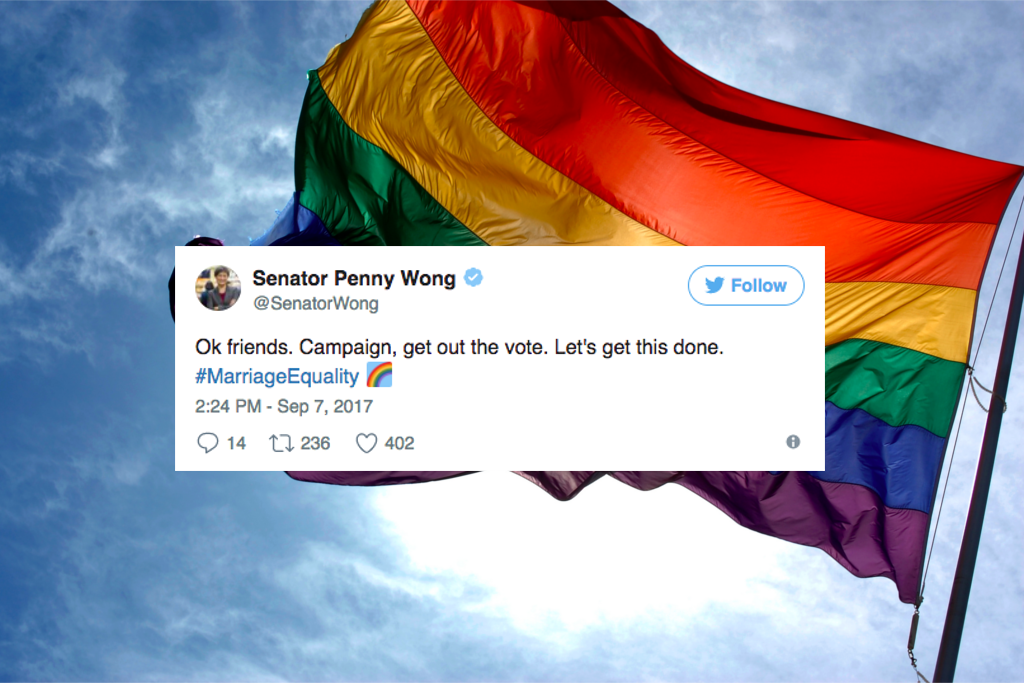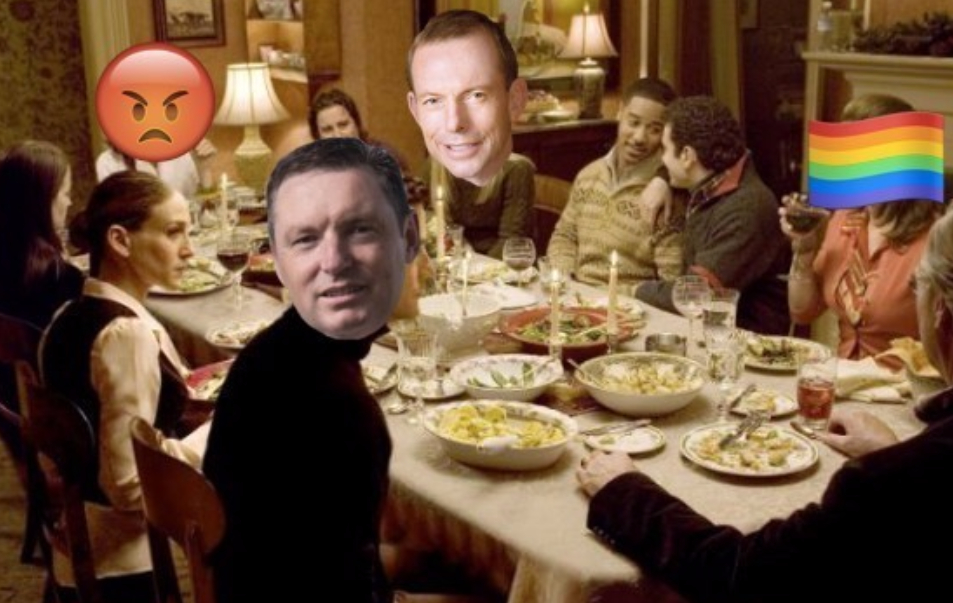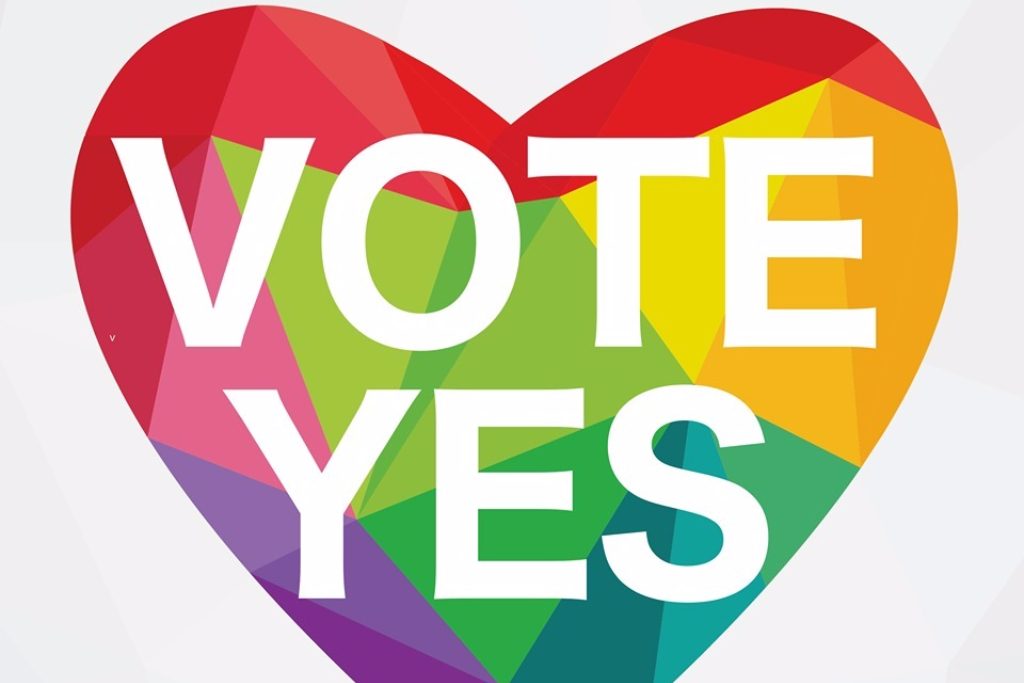LGBTQI+ Aussies, Here’s How You Can Look After Your Mental Health During The Postal Vote

With the postal vote on marriage equality well and truly underway, the next few weeks will be a pretty tough time for many LGBTQI+ Australians.
We’ve seen already that the debate on this issue is anything but respectful, and exposes LGBTQI+ people to lots of really harmful and misleading commentary on their lives, rights and humanity. Even if you’ve managed to avoid some of the worst parts of the debate, just the knowledge that the country is gearing up to hold a vote on your rights is, at best, incredibly draining. Just this morning the Australian Government’s National Mental Health Commission released a statement outlining just how harmful not only the postal vote, but the current state of marriage law in Australia, is for LGBTQI+ Australians.
If you’re an LGBTQI+ person, now is an especially important time to be aware of the services out there to help you take care of your mental health. It’s also worth a reminder that as the marriage equality campaign ramps up, it’s okay to step back or take some time out if you need to. This is a point where allies who are a little more removed from the debate can step up and do the work for a bit (and if you’re an ally reading this with the capacity to help out, you can head to yes.org.au to see what you can do).
Allies, voting yes is great, but there’s lots more you can do. Visit the website & see what you can do to help out. https://t.co/orDBXilDh4
— Bec Shaw (@Brocklesnitch) September 7, 2017
Here are some of the mental health services you can get in touch with if you need a hand, whether that means a quick debrief after a rough day or expert trauma counselling. Nothing is “too small” to ask for help on, so make use of these services. They’re free, professional and there to help you.
Services Specifically For LGBTQI+ People
There are lots of mental health services out there designed specifically for LGBTQI+ people, meaning you can be confident you’ll reach someone who’s across basics like pronouns that can make all the difference.
QLife is a national counselling service for LGBTQI+ people, which operates between 3pm and midnight AEST every day. You can get in touch with them by calling 1800 184 527, or visiting their website if you’d prefer or require a text-based chat.
QLife also has a resource directory on its site that helps you search for local LGBTQI+ services ranging from health services to legal aid and even just social events, which can be a great way to find some fellow queer people to hang out with and get through this. If you’re not sure where to start, though, the counsellors at the main QLife number can help refer you to the best service for you.
If you’re looking for services closer to you, youth mental health organisation ReachOut also has a page of LGBTQI+ mental health services organised by state.
Twenty10 in NSW runs an excellent service that includes a counselling hotline, free in-person counselling sessions, and lots of social events. They also have a very good resource library that’s handy even if you’re not in NSW. In addition to having guides to coming out and starting to transition, it also has videos of people talking about what it means to be bisexual, or trans, or gay. These can be handy to send people if you’re feeling too burnt out or unsafe to speak about your own experience, especially if you’re trying to persuade some No voters.
Mental Health Services More Generally
Unfortunately, LGBTQI+ counselling services like QLife don’t operate 24/7. Thankfully, there are lots of excellent mental health services that do operate round the clock, though these are not specifically targeted at LGBTQI+ people, they do work with LGBTQI+ organisations to train their staff, so you’re in good hands.
Lifeline provide 24/7 crisis support via phone at 13 11 14, or via online chat between 7pm and 4am on their website. And while they’re best known for their suicide prevention work, you can call them if you need help with any kind of mental health issue — loneliness, anxiety, and stresses from work, family or society are all listed as reasons they receive calls.
If you’re under 25, the Kids Helpline runs a 24/7 counselling service via phone at 1800 55 1800, and via text and email on their website. Don’t be put off by the name — they cater to everyone up to age 25, even if you wouldn’t necessarily consider yourself a kid.
Organisations like Headspace and Beyondblue also offer a range of mental health services worth checking out.
And finally, as all of these services note, if your life is in danger, call 000.
Self Care Tips
While you should always combine these tips with expert help when you need it, making sure you’re taking care of yourself is also an important part of getting through postal vote season.
We spoke to some of the counsellors from Twenty10, which recommended a number of self-care strategies, ranging from taking a break from negative news and coverage of the debate, to actively taking time to do some things that make you feel good, like listening to music or going for a walk. They also recommended seeking out LGBTQI+ support and social groups to attend as a source of solidarity and support.
And if you’re new to self care or don’t know where to start, the counsellors at Twenty10 are happy to take your call and point you in the right direction. The overwhelming message here from all of these services is to make use of them — they’re here to help you. Even if you don’t need help right now, check out some of the sites above, bookmark a few so you can find them down the track, and make sure your queer friends and family know they’re there.


